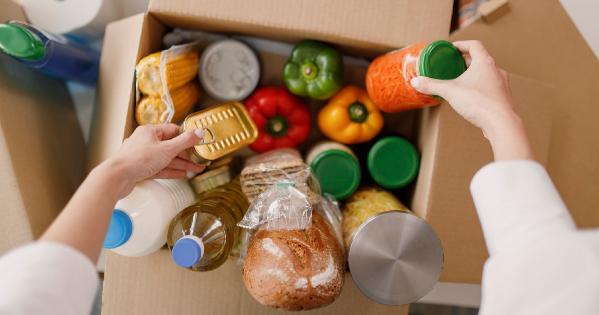Eagles Helping Eagles: The Market Helps Ease Food Insecurity on Campus

Calvin Haney knows a hungry student can’t do their best work.
Haney, associate director of student engagement in the Office of Campus Life (OCL), oversees the Market, American University’s food pantry, which strives to decrease food insecurity on campus.
“Intellectual curiosity can literally only be fueled by healthy bodies,” Haney said. “This is a place where our commitment to and passion around social change and advocacy intersects with the students we hope to serve.”
The Market, located in Mary Graydon Center 308, serves about 75 to 85 students per month and registered more than 500 students during the last academic year. The Market also works with Eagles Helping Eagles, which enables students to donate meal swipes to their peers.
OCL is holding a back-to-school food drive through September 9. Requested donations include such “shelf stable” items as tea, juice boxes, nut milks, seasoning, nut butters, granola bars, cans of chili and soup, and single-sized macaroni and cheese. The Market also needs laundry detergent and unused toiletries. And cash donations—which can be made online—are also encouraged.
Here’s what Haney and Regina Curran, interim assistant vice president of student engagement, want the AU community to know about the Market and food insecurity.
Food insecurity affects college students across the country.
Haney: “Providing access to nutritious food is an opportunity to honor a responsibility bigger than the consumer model. The pantry and initiatives like Eagle Helping Eagles aim to provide a sense of security, safety, and assuredness that their college experience can be rewarded. There’s a presumption that you're in college and that either everyone has a meal plan or everyone has sufficient means once tuition is met. That’s just not the reality.”
Food insecurity plagued DC even before the pandemic.
Haney: “We’re not in a food desert at AU, but we are in a challenging area for equitable access to nutritious food for all income levels. That’s where the Market and Eagles Helping Eagles can best serve as an intervention to either subsidize students’ grocery shopping or help them think more critically about how they spend and engage with nutritious foods.”
We won’t turn away any donations—but give what you would like to eat.
Haney: “The challenge with charitable giving is that folks will give the white beans that they don’t use or a dented can of green beans. Think about how you would support yourself in a moment of need, and act in an equitable way that affords a sense of dignity to those accessing our services.”
Curran: “Think about the types of spaces that our students live in. Some are in residence halls. Some aren’t on meal plans, and they may not have access to the same type of kitchenware or appliances. Our list focuses on things that are simple, things pretty much anyone can make with the most basic kitchenware. Just check those expiration dates. If it’s expired, it’s not something we are going to be able to use.”
The need is greater than dry food donations.
Curran: “We really do need a balance between cash donations and donations of goods. Cash donations allow us to stock fresh produce, which is time-sensitive, and some of those other items that really have high nutritional value but might not be shelf stable. If someone was saying, ‘I could go take this $25 and spend it at Giant, or I could go online and make that donation with the $25,’ I would actually encourage them to do the latter.”
